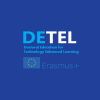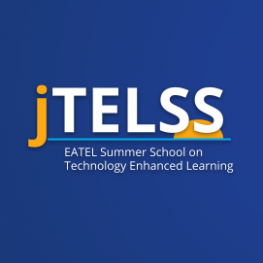Speakers
Luis P. Prieto
Universidad de Valladolid, SpainYagmur Cisem Yilmaz
Tallinn University, EstoniaStart
23/05/2022 - 14:00
End
23/05/2022 - 15:30
A gentle introduction to Learning Analytics
Monday 23/05 14:00-15:30h
Main Hall
This session is organized by the DETEL Erasmus+ project. 
DETEL is a strategic partnership among nine European universities and EATEL to reflect their expertise in doctoral education into a new study program in TEL, extended with rich and professionally produced OERs.
Abstract
With more and more of our learning happening in digital spaces (already before, but especially after the pandemic hit), great challenges and opportunities have been unearthed in educational research and practice. Monitoring, finding struggling learners and supporting the learning process has become more difficult for instructors. Yet, the traces of learners’ behavior online (and also in the physical world, thanks to cheaper sensing technologies) may also hold the key to make instructor support more accurate and to scale it up to larger numbers of students. Further, these detailed data increasingly available can help researchers achieve a new understanding of how learning processes unfold.
In this webinar, we will gain an initial understanding of the research field that tackles these challenges and opportunities: learning analytics (LA). Through hands-on individual and group activities, participants will be exposed to several real LA technologies and conceptual frameworks, so that they can both define LA and understand its benefits and risks – both as a fascinating field of study, and as a tool that educational scientists and practitioners can exploit to better understand and support learning.
Needs Analysis
Since its inception around 2011, the Learning Analytics (LA) research community has grown very rapidly in importance, to the point of being a large (probably the largest) sub-area within TEL, as can be seen in scientific conferences such as EC-TEL. Yet, its quite technical nature makes LA a sort of foreign “black box” for many TEL doctoral students that have a more educational or psychology background. Conversely, tech-savvy doctoral students often miss what are the educational implications behind these uses of AI in real educational practice. This workshop is intended as a gentle introduction to LA for an interdisciplinary doctoral audience, in which participants will get to experience LA technologies first-hand (e.g., a multimodal LA system), and will be given simple but powerful conceptual frameworks to help them understand and categorize LA technologies that they may encounter in the future. Given the variety of perspectives that may be present at the workshop, it will also incorporate time for particular questions and answers that PhD students may have about this cutting-edge and often misunderstood set of technological innovations.
Learning Objectives
After the course, participant PhD students will:
- be able to define learning analytics in their own words.
- understand what kinds of learning analytics solutions are possible (i.e., what is the design space of LA)
- understand the potential benefits and risks that LA technologies can bring, for educational research and practice
- be familiar with multiple LA tools, as well as underlying technologies and learning resources where they can deepen their knowledge of this research field and its practice
Pre-activities
The workshop will follow a flipped classroom approach (as do the webinars on which it is inspired). Hence, we will ask participants to perform a few preparatory activities, to begin contact with some of the ideas and technologies in the workshop:
- Reading: Understanding Learning Analytics by example
- Exercise: Define Learning analytics in your own words
- Reading: A conceptual framework for Learning Analytics (Greller & Drachsler, 2012)
Session Description
The session will consist mainly of participatory and group activities, with small mini-lectures inter-spersed in them:
- Introduction to LA
- Group activity: LA definition in your own words (using CoTrack LA tool)
- Discussion: Looking at real LA data – the case of CoTrack for collaboration
- Applying LA: Infrastructures, tools and toolkits
- Group activity: Placing two LA tools in the design space (using CoTrack LA tool)
- Researching LA: Paradigms and wicked problems
- Q&A: What you always wanted to know about LA but never dared to ask
Post-activities
Participants will be encouraged to dive deeper into different parts of the research in LA that interest them most, through different educational resources:
- SoLAR’s Handbook of Learning Analytics
- NYU’s Learning Analytics 101
- Prinsloo, Slade & Khalil’s Learning Analytics: A Primer
- MOOCs on Learning Analytics (e.g., by UTArlington, UMichigan)


